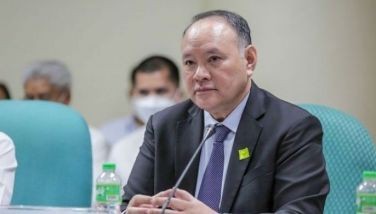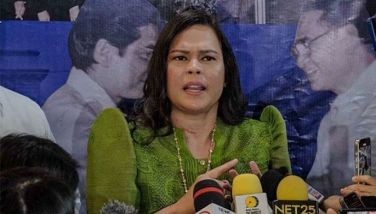GSIS insurance monopoly: A never-ending scam
November 7, 2001 | 12:00am
Philippine Center for Investigative Journalism
For years, local firms in collusion with some of the biggest insurance companies in the world, including the likes of British company Jardines have fattened themselves from bloated premiums and commissions from government agencies.
Their accomplice: no less than the Government Service Insurance System (GSIS).
Republic Act 656, enacted in 1951, gave the state pension fund the sole authority to insure all property owned by the government — from power plants to roads and bridges to office buildings.
The GSIS estimates it currently insures P1.5 trillion worth of state assets. To limit potential losses from such a big exposure, it passes on much of the risks to private insurance companies that then "reinsure" what the GSIS had not covered. The GSIS employs the services of brokers that negotiate with private reinsurers, most of them based in London, the world’s insurance capital.
"The spirit of the law gave GSIS the advantage of a monopoly for it to be in a position to command rates in the market that will benefit the government," says Honesto General, an insurance columnist and president of the Association of Insurance Brokers of the Philippines (AIBP).
But, says General, this has not been the case. Rather than using its monopoly to bargain for better rates, the GSIS has conspired with private brokers and reinsurers to skim off huge commissions that can be made from fat insurance premiums.
The GSIS, says Sen. Sergio Osmeña III, has been part of "a never-ending scam" to defraud the government through inflated insurance fees.
Private insurers interviewed for this report say that since the Marcos administration, insurance firms and their brokers have made a killing on GSIS reinsurance contracts. These brokers normally set aside huge entertainment allowances to wine and dine officials of the GSIS and those of the insured government agencies, says a long-time insurance consultant who asked not to be named.
The GSIS, say several sources in the insurance industry, has consistently charged government agencies overpriced insurance premiums so it could pay fat commissions to favored brokers and reinsurers.
Such overcharging is done with the collusion of the top finance people of the insured government entities, who inflate the losses on insured properties to justify higher premiums. More premiums paid by the insured agencies translate to bigger commissions for the GSIS and its brokers, say insurance industry insiders.
The bigger and more complicated the risk, the bigger the number of brokers and reinsurers involved. The commissions in turn become heftier, as these are paid each time the transaction is passed from one reinsurer to another. Industry sources estimate commissions usually range from 2.5 to 10 percent of the insurance premium, depending on the nature of the risk.
For complex and jumbo deals, the GSIS usually retains just one to 30 percent of the premium. This means it reinsures 70 to 99 percent with foreign companies which have the financial clout to absorb bigger risks.
Ultimately, the high cost of insuring government property is borne by the public, either in the form of higher government fees or of deteriorating public services.
Osmeña says the scam continues because the public is not interested in the esoteric workings of the insurance industry. The reinsurance process is also made up of layers of deals, making it difficult to track down the extent of the fraud.
In 1994, a team from the Commission on Audit tried to go to London to investigate the reinsurance fraud, COA auditors say. This was after they had uncovered huge losses in the GSIS arising from premium advances to favored brokers, and unpaid insurance claims.
The COA found that when the insurance claims of some government agencies rose, these brokers suddenly declared bankruptcies, leaving huge unpaid claims in the books of GSIS and the state agencies insured.
The Senate also did a probe in 1996, on the basis of a COA report that showed the GSIS had more than P500 million in uncollected claims from foreign and local reinsurance firms as of end-1994.
As a result of the Senate probe, the GSIS charter was amended in 1997, placing its investment activities under the Insurance Commission’s watch. Still, this did not plug the loopholes that made connivance on reinsurance deals possible.
Osmeña, who was a member of the joint Senate committee investigation in 1996, likened the reinsurance scam to the Russian matrushka doll. "Once you opened it, you end up discovering another doll inside. You won’t know how deeper it goes."
Osmeña said close friends of Marcos cronies had set up reinsurance brokers with British-sounding names to create the illusion they were reputable members of the Lloyds Group of London. With the collusion of GSIS officials, these local brokers overpriced the insurance premiums on government property and got fat commissions, he said.
By the time the insured agencies filed huge claims, some of the reinsurance brokers had closed shop. For years, these brokers merely paid smaller claims out of the premiums from the insured state agencies but did not set aside a buffer to cover huge losses. When the claims mounted, they delayed payment as long as they could until they went belly up.
Lawyer Winston F. Garcia said he tried to learn from these mistakes and that his first acts as GSIS president and general manager was to "clean up" the reinsurance business, where "small-time" insurance brokers had made a killing on GSIS contracts by ceding the business to dubious reinsurers abroad.
Before he took over, Garcia said most of the reinsurance deals at GSIS were "broker-initiated." Brokers offered insurance to a government agency, referred the business to the GSIS and then got a commission. The GSIS automatically renewed contracts with brokers "without the benefit of a public bidding." (To be continued)
Their accomplice: no less than the Government Service Insurance System (GSIS).
Republic Act 656, enacted in 1951, gave the state pension fund the sole authority to insure all property owned by the government — from power plants to roads and bridges to office buildings.
The GSIS estimates it currently insures P1.5 trillion worth of state assets. To limit potential losses from such a big exposure, it passes on much of the risks to private insurance companies that then "reinsure" what the GSIS had not covered. The GSIS employs the services of brokers that negotiate with private reinsurers, most of them based in London, the world’s insurance capital.
"The spirit of the law gave GSIS the advantage of a monopoly for it to be in a position to command rates in the market that will benefit the government," says Honesto General, an insurance columnist and president of the Association of Insurance Brokers of the Philippines (AIBP).
But, says General, this has not been the case. Rather than using its monopoly to bargain for better rates, the GSIS has conspired with private brokers and reinsurers to skim off huge commissions that can be made from fat insurance premiums.
The GSIS, says Sen. Sergio Osmeña III, has been part of "a never-ending scam" to defraud the government through inflated insurance fees.
Private insurers interviewed for this report say that since the Marcos administration, insurance firms and their brokers have made a killing on GSIS reinsurance contracts. These brokers normally set aside huge entertainment allowances to wine and dine officials of the GSIS and those of the insured government agencies, says a long-time insurance consultant who asked not to be named.
The GSIS, say several sources in the insurance industry, has consistently charged government agencies overpriced insurance premiums so it could pay fat commissions to favored brokers and reinsurers.
Such overcharging is done with the collusion of the top finance people of the insured government entities, who inflate the losses on insured properties to justify higher premiums. More premiums paid by the insured agencies translate to bigger commissions for the GSIS and its brokers, say insurance industry insiders.
The bigger and more complicated the risk, the bigger the number of brokers and reinsurers involved. The commissions in turn become heftier, as these are paid each time the transaction is passed from one reinsurer to another. Industry sources estimate commissions usually range from 2.5 to 10 percent of the insurance premium, depending on the nature of the risk.
For complex and jumbo deals, the GSIS usually retains just one to 30 percent of the premium. This means it reinsures 70 to 99 percent with foreign companies which have the financial clout to absorb bigger risks.
Ultimately, the high cost of insuring government property is borne by the public, either in the form of higher government fees or of deteriorating public services.
Osmeña says the scam continues because the public is not interested in the esoteric workings of the insurance industry. The reinsurance process is also made up of layers of deals, making it difficult to track down the extent of the fraud.
In 1994, a team from the Commission on Audit tried to go to London to investigate the reinsurance fraud, COA auditors say. This was after they had uncovered huge losses in the GSIS arising from premium advances to favored brokers, and unpaid insurance claims.
The COA found that when the insurance claims of some government agencies rose, these brokers suddenly declared bankruptcies, leaving huge unpaid claims in the books of GSIS and the state agencies insured.
The Senate also did a probe in 1996, on the basis of a COA report that showed the GSIS had more than P500 million in uncollected claims from foreign and local reinsurance firms as of end-1994.
As a result of the Senate probe, the GSIS charter was amended in 1997, placing its investment activities under the Insurance Commission’s watch. Still, this did not plug the loopholes that made connivance on reinsurance deals possible.
Osmeña, who was a member of the joint Senate committee investigation in 1996, likened the reinsurance scam to the Russian matrushka doll. "Once you opened it, you end up discovering another doll inside. You won’t know how deeper it goes."
Osmeña said close friends of Marcos cronies had set up reinsurance brokers with British-sounding names to create the illusion they were reputable members of the Lloyds Group of London. With the collusion of GSIS officials, these local brokers overpriced the insurance premiums on government property and got fat commissions, he said.
By the time the insured agencies filed huge claims, some of the reinsurance brokers had closed shop. For years, these brokers merely paid smaller claims out of the premiums from the insured state agencies but did not set aside a buffer to cover huge losses. When the claims mounted, they delayed payment as long as they could until they went belly up.
Lawyer Winston F. Garcia said he tried to learn from these mistakes and that his first acts as GSIS president and general manager was to "clean up" the reinsurance business, where "small-time" insurance brokers had made a killing on GSIS contracts by ceding the business to dubious reinsurers abroad.
Before he took over, Garcia said most of the reinsurance deals at GSIS were "broker-initiated." Brokers offered insurance to a government agency, referred the business to the GSIS and then got a commission. The GSIS automatically renewed contracts with brokers "without the benefit of a public bidding." (To be continued)
BrandSpace Articles
<
>
- Latest
- Trending
Trending
Latest
Trending
Latest
Recommended






























